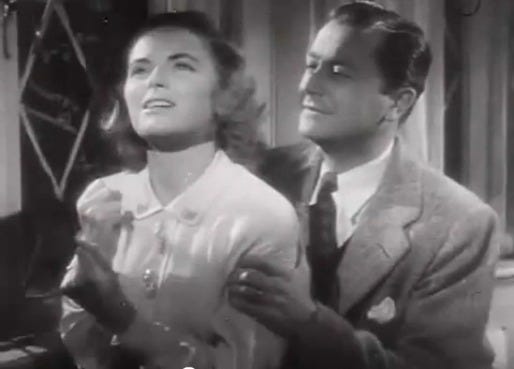The Enchanted Cottage (1945)

At first glance, "The Enchanted Cottage" might seem like another mushy midcentury romance, with the characters shot in gauzy halos as they make their ubiquitous protestations of undying love. Except for one thing: It came out just a few months before the end of World War II and depicts the debilitating effects of that terrible conflict on the very face and body of its male star.
Robert Young was no great beauty, at least compared to contemporaries like Clark Gable, Gary Cooper, Cary Grant or Errol Flynn. But even in 1945, the future "Father Knows Best" star projected an image of ideal American manhood — masculine yet warm.
It must have been quite a shock for audiences to see him with one arm dangling useless and the right side of his face criss-crossed with scars. One of the scars even extends into his eyes, causing it to droop in a way reminiscent of a stroke victim.
Remember this is a time when the President of the United States was never photographed sitting in his wheelchair and coverage of the war wounded tended to focus on their valiant efforts rather than their disablements.
The story is based on a play written by Arthur Wing Pinero about a disabled WWI soldier; it was also turned into a silent film in 1924. In the updated version, Young plays Oliver Bradford, a dashing rich socialite about to be married (to Hillary Brooke) when he is sent off to war as a pilot. They had rented a remote cottage for their honeymoon — actually the only remaining wing of a much larger house fallen into ruin — but never got to use it.
Mrs. Minnett (Mildred Natwick) is the prickly older woman who owns and runs the cottage, used only by newlyweds who scratch their names in the glass of the front window panes. Young Laura Pennington (Dorothy McGuire) comes to work there as the maid, intrigued by the legends surrounding the cottage.
When Oliver returns from the war a year later — disfigured and his engagement ended — he forms a friendship with the homely girl that grows into love. She marries him, more out of pity than anything else, but they find the magic of the cottage has transformed them into beautiful creatures. His scars disappear and he even regains the use of his right arm.
The sections focusing on Laura's loneliness are particularly strong, especially the scene where she attends a large dance and none of the soldiers will invite her onto the floor. A couple even spy her pining from a distance and move in, but when they see her face, they back off and pretend to look the other way.
Notably, McGuire achieved her spinster look without the aid of any special makeup or effects. They simply made up her hair in an unattractive way, dressed her in ill-fitting clothes, and she achieved the rest with her facial expressions and hunched posture.
It's a pretty convincing juxtaposition, though of course she doesn't really look that bad even during her "plain" phase. It's a Hollywood Ugly: If she's homely, then I'm a bridge troll.
I was particularly impressed with Herbert Marshall as John Hillgrove, a veteran who lost his sight during World War I and became a celebrated pianist. He becomes Laura and Oliver's closest friend and confidante who, despite his blindness, sees the true nature of their enchantment before anyone else does.
In actuality, Marshall was sighted, wearing special contact lenses to turn his pupils almost colorless. The effect is to make him look like a seer or prophet. But he did only have one leg, losing the other in WWI, though the way he walks and moves you'd hardly guess it.
Marshall had a long career on stage and screen without hardly any of his audience knowing about his true disability. His rich, deep voice has an almost musical quality; he often seems to be practically singing his dialogue.
John Cromwell directs with a steady hand, though I admit the last portion of the film where the gorgeous couple resides in bliss is the least interesting section to me. It's only a matter of time before they discover that there is no magic, only their love for each other that allows them to see each other as beautific.
It's in the darker, despondent sections that "The Enchanted Cottage" weaves its most powerful spell.
4 Yaps



